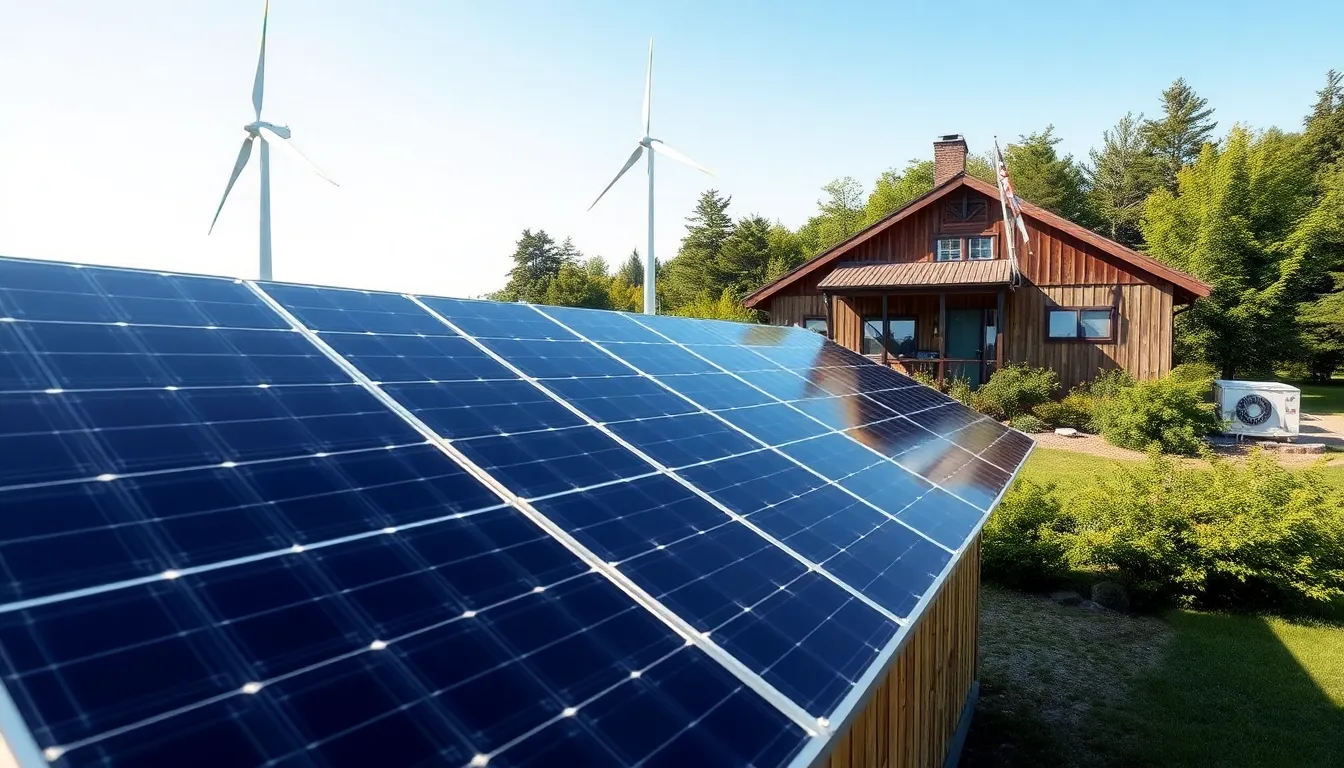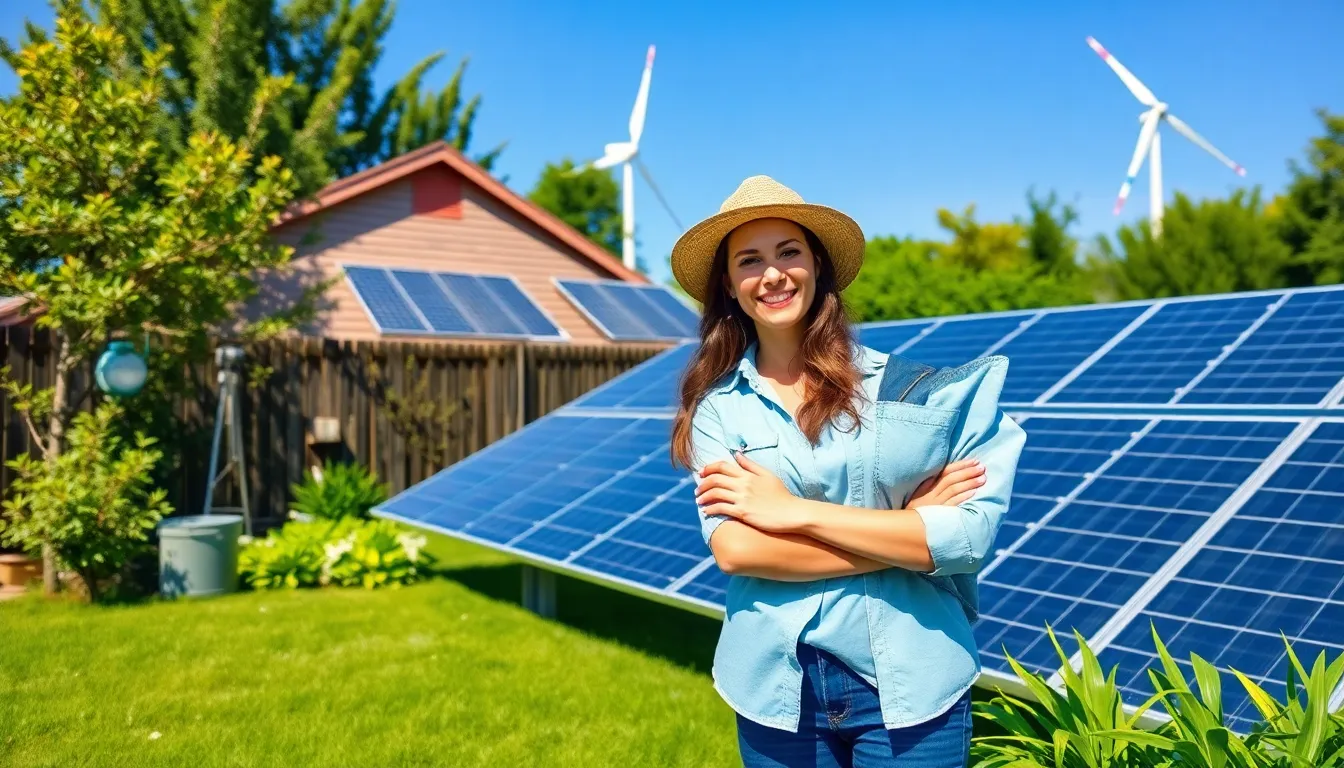In a world where power outages can feel like a personal vendetta, off-grid technology is the superhero nobody knew they needed. Imagine living in harmony with nature while enjoying the comforts of modern life. It’s not just a dream; it’s a reality for those who dare to unplug from the chaos of the grid.
Table of Contents
ToggleOverview of Off-Grid Technology
Off-grid technology represents a shift towards energy independence. This technology allows individuals and communities to generate, store, and utilize their own energy sources, eliminating reliance on traditional power grids. Solar panels serve as a common renewable energy source, converting sunlight into electricity. Wind turbines also play a vital role, harnessing wind energy to produce power, especially in areas with consistent winds.
Water conservation technologies like rainwater harvesting systems complement energy solutions. These systems collect and store rainwater for various uses, including gardening and household needs. Battery storage solutions, such as lithium-ion batteries, provide reliable energy storage. They ensure that energy remains accessible during periods of low generation.
Smart home systems optimize energy consumption through automation and monitoring. These systems can adjust energy use based on availability, making off-grid living more efficient. Additionally, bioenergy options like biogas generators transform organic waste into usable energy. They create a sustainable loop, reducing waste while generating power.
Living off-grid fosters a stronger connection to the environment. It encourages sustainable practices, like permaculture, which focus on developing self-sustaining ecosystems. Adopting off-grid technology can lead to significant economic benefits as well. Many individuals experience reduced utility costs and lower overall expenses while enjoying a more self-sufficient lifestyle.
Off-grid technology encompasses various energy-generating and resource-saving innovations. Embracing these technologies enables a harmonious relationship with nature while maintaining modern conveniences. The off-grid lifestyle proves feasible, promoting sustainability and self-sufficiency.
Benefits of Off-Grid Technology

Off-grid technology offers significant advantages in today’s energy landscape. It promotes sustainability while fostering independence from conventional power systems.
Environmental Impact
Off-grid technology significantly reduces carbon footprints. Utilizing renewable energy sources such as solar panels and wind turbines leads to fewer greenhouse gas emissions. Communities harnessing local resources decrease the strain on centralized energy grids. Rainwater harvesting systems enhance water conservation efforts, minimizing waste. Biodiversity can flourish when natural habitats remain undisturbed, supporting healthier ecosystems. With less energy consumed from non-renewable sources, the overall environmental balance improves.
Cost Savings
Cost savings become apparent with off-grid living. Individuals benefit from reduced utility bills, especially in remote areas where grid connection is expensive. Initial investments in solar panels and batteries yield long-term financial returns. Maintenance costs remain low compared to traditional systems, further enhancing affordability. Handling energy needs independently shields users from rising energy prices. The potential for selling excess energy back to the grid adds an additional revenue stream. Overall, embracing off-grid technology leads to lower monthly expenses and greater financial freedom.
Types of Off-Grid Systems
Off-grid systems encompass a variety of technologies that enable energy independence. Two primary components of these systems include renewable energy sources and energy storage solutions.
Renewable Energy Sources
Solar panels and wind turbines provide significant energy-generation capabilities. These technologies harness natural resources, converting sunlight and wind into electricity. Geothermal and hydroelectric systems also qualify as renewable energy sources in specific locations. Biomass systems convert organic materials, like agricultural waste, into usable energy. By diversifying energy sources, off-grid systems enhance reliability, ensuring continual power during fluctuating weather conditions.
Energy Storage Solutions
Battery storage systems play a crucial role in off-grid setups. Lithium-ion and lead-acid batteries help ensure energy availability during low generation phases. Energy management systems integrate innovative software to optimize battery use, extending system life. Users can also invest in larger capacity storage options for increased reliability. Efficient energy storage allows individuals to harness excess energy produced during peak generation times, granting increased self-sufficiency and minimizing waste.
Challenges in Implementing Off-Grid Technology
Implementing off-grid technology brings several challenges that require careful consideration.
Initial Investment
Initial investment costs represent a significant barrier for many individuals and communities. Solar panels, wind turbines, and battery storage systems require substantial upfront capital. Prices vary, with solar installations ranging from $10,000 to $30,000, depending on system size. Furthermore, professional installation adds to the expenditures. Financial incentives exist, such as tax credits and rebates, helping to offset these costs. Short-term sacrifices often lead to long-term savings, yet the high initial outlay remains a critical point of concern.
Maintenance and Reliability
Maintenance and reliability issues can complicate off-grid living. Regular upkeep is necessary for renewable energy systems to function optimally, including periodic checks on solar panels and battery health. Depending on the system size, maintenance costs can range from $300 to $1,000 annually. Reliability also hinges on weather conditions; energy generation may decrease on cloudy or windless days. Users often need backup solutions like generators to ensure steady power access. Addressing these factors is essential for prolonged dependability and efficiency.
Future of Off-Grid Technology
Off-grid technology continues to evolve, presenting exciting opportunities for energy independence and sustainability.
Innovations on the Horizon
Advancements in off-grid technology show great promise. Next-generation solar panels increase efficiency by 20% or more, making energy capture even more effective. Innovative energy storage solutions, such as solid-state batteries, enhance capacity and lifespan, offering longer-lasting energy availability. Emerging technologies focus on smart grids that enable real-time monitoring and automation of energy use. These systems optimize energy management, aligning consumption with production for maximum efficiency. In addition, breakthroughs in biogas technology provide cleaner and more efficient methods for converting organic waste into energy. Overall, these innovations pave the way for a more sustainable and reliable off-grid future.
Growing Adoption Worldwide
The global shift toward off-grid solutions gains momentum. Developing countries often adopt off-grid systems due to limited access to traditional energy infrastructure. In regions like Sub-Saharan Africa, where nearly 600 million people lack electricity, off-grid solar solutions provide an essential lifeline. In industrialized nations, residential homes increasingly utilize solar panels and battery storage systems to reduce reliance on the grid. Numerous governments offer incentives, encouraging wider adoption of renewable energy sources. Surveys show that, by 2025, up to 20% of households in the US may rely on off-grid systems. As awareness grows, so does the commitment to sustainable living through off-grid technology.
Off-grid technology offers a transformative path toward energy independence and sustainability. By embracing renewable energy sources and innovative solutions, individuals and communities can reduce their environmental impact while enjoying modern conveniences. The challenges associated with initial investments and maintenance are outweighed by the long-term benefits of cost savings and resilience against rising energy prices.
As advancements continue to emerge, the future of off-grid living looks promising. Enhanced efficiency in solar panels and storage solutions will empower more households to adopt this lifestyle. Ultimately, off-grid technology not only fosters a deeper connection with nature but also paves the way for a more sustainable and self-sufficient future.



